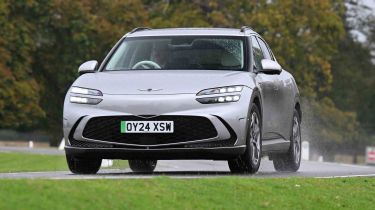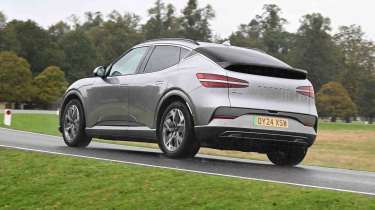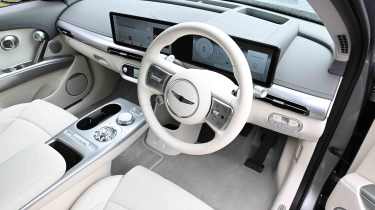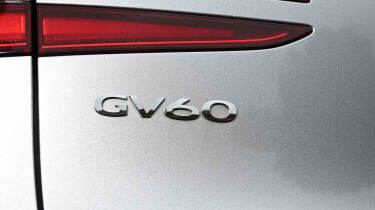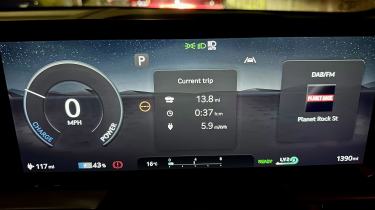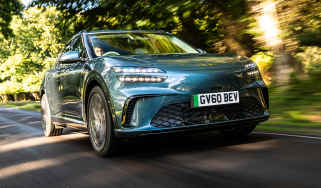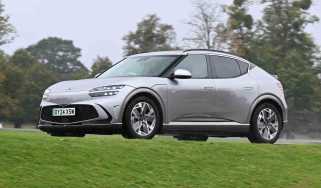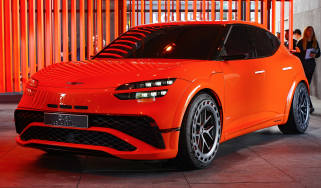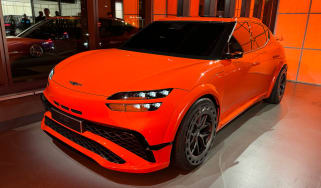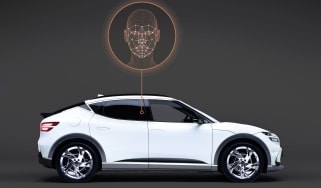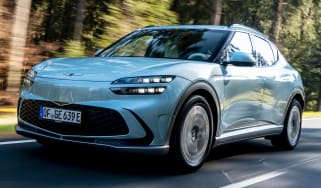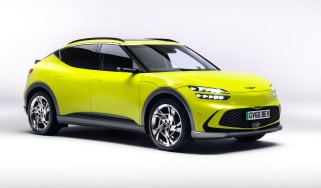Genesis GV60 review
The Genesis GV60 is a desirable and upmarket, if slightly unconventional, all-electric family car

Is the Genesis GV60 a good car?
Even though it’s been around a few years, the Genesis GV60 is still one of the most advanced electric cars around. Some may find it unconventional to look at, but you can’t argue with its efficiency, long range, and ultra-rapid charging speeds that help take the anxiety out of EV ownership.
Admittedly, some details seem borderline chintzy, but underneath the swizzling crystal ball gear selector is the same platform used by the brilliant Hyundai Ioniq 5 and Kia EV6, but with an added dose of refinement and a more luxurious interior. That does mean it isn’t the cheapest way into an electric car, but strong equipment levels and an excellent five-year, unlimited mileage warranty package help soften that financial hit.
| Key specs | |
| Fuel type | Electric |
| Body style | Coupe SUV |
| Powertrain |
77.4kWh, 1x e-motor, rear-wheel drive 77.4kWh, 2 e-motors, four-wheel drive |
| Safety | 5-star Euro NCAP |
| Warranty | 5yrs, unlimited mileage |
How much does the Genesis GV60 cost?
The Genesis brand only launched in the UK in mid-2021, but Hyundai’s luxury spin-off is confident of its premium ambitions, with the GV60 starting at just over £54,000. The quicker Sport four-wheel drive version commands a premium, coming in at a little over £58,500, before topping out at just under £68,000 for the hottest Sport Plus model.
The GV60 isn’t the brand’s only EV, because there’s also the Genesis Electrified G80 saloon and Genesis Electrified GV70 SUV. However, both of these are based on combustion-engined cars, whereas the GV60 is the first pure-electric Genesis.
Used - available now
Underneath the thoroughly distinctive bodywork is the same E-GMP platform that underpins the Hyundai Ioniq 5 and Kia EV6, with every GV60 powered by a 77.4kWh battery. Buyers get a choice of three trim levels as we mentioned above: Premium, Sport, and Sport Plus. Premium trim is rear-wheel drive only, while the others get dual-motor, four-wheel drive set-ups. Power outputs range from 226bhp to 483bhp, while the range stretches from 289 to 321 miles, depending upon which trim level you go for.
Electric motors, performance & drive
Compared with the likes of the Nissan Ariya and Volkswagen ID.5, the GV60 has the softest suspension. In some areas, this approach works very well; on a motorway cruise, it takes on a floaty yet sure-footed gait, which is deeply relaxing. It’s even more so if you engage the self-steering system, which guides you between lanes automatically for short periods. There is a touch more wind noise than we experienced in the Nissan or the Volkswagen, though.
However, find a twisty road, and the GV60 doesn’t feel as well tied down as its sibling, the Kia EV6. But thanks to a neutral balance, its well-weighted steering and the rear-wheel-drive layout of our test car, it’s still a satisfying car to drive. Opt for the four-wheel drive Sport or Sport Plus version, and you can feel the front wheel come into play, with the additional traction benefits of its four-wheel drive system dragging you out of corners if you put your foot down. Body roll is noticeable in all versions, but it doesn’t get out of hand.
At lower speeds, the ride can be a little fidgety - especially in Sport Plus models with the largest 21-inch wheels. The GV60 can also feel like a larger car than it is from behind the wheel because its 11.9-metre turning circle is 1.1 metres more than the Nissan’s and 1.7 metres larger than the ID.5’s, making it the least manoeuvrable in tight spaces.
We like that the Genesis offers drivers more scope for adjusting the brake regeneration compared with some of its rivals, though, thanks to paddles on the steering wheel. The five modes range from complete freewheeling right up to full one-pedal driving. The GV60’s regenerative braking can occasionally engage more harshly than you might expect, but overall the powertrain is slick.
| Model | Power | 0-62mph | Top speed |
| GV60 Premium 77kWh RWD | 226bhp | 7.8 seconds | 115mph |
| GV60 Sport 77kWh AWD | 314bhp | 5.5 seconds | 124mph |
| GV60 Sport Plus 77kWh AWD | 483bhp | 4.0 seconds | 146mph |
0-62mph acceleration and top speed
The entry-level, rear-wheel-drive GV60 Premium produces 226bhp and 350Nm of torque – enough to propel the car from 0-62mph in 7.8 seconds. This is the version we drove; the single motor feels keener than the Nissan’s initially, but once up to speed, the pair feel very similar. Top speed stands at 115mph.
Upgrading to the GV60 Sport adds another electric motor for all-wheel drive, bumps the output to 314bhp and 605Nm of torque, and knocks the 0-62mph time down to 5.5 seconds. It also increases the top speed to 124mph.
Finally, there’s the GV60 Sport Plus. It’s not quite as quick as the Kia EV6 GT, but it’s got 483bhp and 700Nm, so 0-62mph takes just four seconds if you activate boost mode and it’ll keep going until you hit 146mph, says Genesis. This version also gets a drift mode that temporarily switches the car to a rear-wheel-drive bias for more oversteer in the corners, although quite why you’d want that in your luxurious family EV is beyond us.
Range, charging and running costs
Every GV60 uses a 77.4kWh battery but range varies from model to model. The entry-level Premium version is rated do 321 miles on a charge, while the dual-motor Sport and Sport Plus models will cover 292 and 289 miles, respectively, before needing to be plugged in.
When we drove the GV60 Premium, it returned a very impressive 4.0 miles per kilowatt-hour, trumping the 3.9mi/kWh we got from a Volkswagen ID.5 and 3.7mi/kWh we saw in a 63kWh Nissan Ariya we tested in the same conditions. That equates to a real-world range of 296 miles for the entry-level GV60 based on its useable battery size of 74kWh – about 10 per cent less than the claimed WLTP range.
Charging plays a huge part in the life of anyone who drives an electric vehicle, whether that be a compact van or a luxury limousine. Exactly how fast an EV can charge is a key consideration for those who cover a lot of miles, because the quicker the car can replenish its battery, the less time you’ll need to spend waiting to hit the road again.
From this perspective, the Genesis is way out in front of the competition. Find a charger quick enough, and it’ll officially recharge at speeds as high as 220kW, meaning that a 10 to 80 per cent top-up – which would add roughly 200 miles of range – can take as little as 18 minutes. Compared with a Nissan Ariya that can only reach 130kW, the same 10 to 80 per cent charge requires around 30 minutes of your time.
For many electric car owners, it’ll be home charging that’s more important, where you’ll top up your battery after work at home, ready for the next morning. Every GV60 features a 77.4kWh battery which you’ll need a little under 12 hours to fully recharge using a regular 7.4kW home wallbox.
Running an EV really comes into its own if you’re a company-car user, thanks to Benefit-in-Kind calculations that strongly favour zero-emissions vehicles. The GV60 falls into the two per cent BiK bracket.
| Model | Battery size | Range | Insurance group |
| GV60 Premium 77kWh RWD | 77kWh (74kWh useable) | 321 miles | 41A |
| GV60 Sport 77kWh AWD | 77kWh (74kWh useable) | 292 miles | 44E |
| GV60 Sport Plus 77kWh AWD | 77kWh (74kWh useable) | 289 miles | 48E |
Insurance groups
Compared with other electric cars in this price range, the GV60 will be particularly expensive to insure. Even the base Premium model falls into insurance group 41 (out of 50), while Sport and Sport Plus versions attract ratings of groups 44 and 48, respectively.
Depreciation
According to our latest expert data, the GV60 is expected to retain between 37 to 41 per cent of its original value after three years of ownership and 36.000 miles. The entry-level Premium model performs the best, while the Sport Plus loses the most. However, the Kia EV6 retains between 42 to 44 per cent, while the Hyundai Ioniq 5 retains between 43 to 51 percent.
To get an accurate valuation for a specific model, check out our valuation tool...
Interior, design and technology
It might be based on the same platform as the Hyundai Ioniq 5 and Kia EV6, but you wouldn’t know that from looking at the GV60. It's the same story with every Genesis model, whereby the South Korean brand takes familiar underpinnings and layers distinctive styling on top. The GV60 features the firm’s signature split headlight design and Aston Martin-esque winged badge on the nose, as well as a sloping roofline, large alloy wheels and volt emblem on the C-pillar that are as polarising as they are eye-catching.
The cabin offers plenty of drama and luxury, and the quality it offers does go some way to justifying the high price tag compared with other electric family SUVs. For instance, the chunky steering wheel is trimmed in plush, soft leather, and you can get contrasting stitching and piping across the seats and dashboard.
Some switchgear falls a little short of the premium billing, though. The rotary gear selector is one of the GV60’s more polarising features; it’s hidden when the car’s off, but start it up and the crystal-like ball spins to reveal the dial.
Another unique feature is the facial recognition technology added for 2023, or Fact Connect as Genesis calls it. Essentially, the car stores biometric data that allow it to ‘recognise’ the face of the registered owner, enabling them to drive their GV60 without the key being present.
Sat-nav, stereo and infotainment
Derived from the same systems you’ll find in a Kia or Hyundai, Genesis’s infotainment set-up is logical to use and packed with features. The home screen is made up of four main pages; you swipe across these to bring up shortcuts and menus. The screen itself looks clear and the graphics are neat, plus Apple CarPlay and Android Auto connectivity are both standard. It differs from its EV6 and Ioniq 5 siblings by offering a rotary controller near to the gear lever to offer an alternative way to control the touchscreen while driving. It isn’t perfect, but is far less distracting to use while on the move when compare with having to lean over and jab away at icons on a screen.
We’re big fans of the side-mounted blind-spot cameras that come as part of the rather pricey £2,800 Innovation Pack. When you indicate, a camera feed is displayed clearly in the digital dials ahead of the driver, showing what’s to the side of you when changing lanes on the motorway and helping to identify any cyclists approaching when turning at a junction. A forward-facing camera is one of the screens that can be brought up between the main instruments, too.
The system is clearly laid out, but it’s not perfect in every area; when it comes to switching through the driver-assist systems or using the sat-nav, it needs a few more button presses than we’d like. That means it takes longer to plot and load a route than in a VW ID.5 or Nissan Ariya.
Climate controls are accessed on a panel below the main display, while a couple of physical shortcut keys are within easy reach on the centre console.
Boot space, comfort & practicality
| Dimensions | |
| Length | 4,515mm |
| Width | 1,890mm (2,150mm inc. mirrors) |
| Height | 1,580mm |
| Number of seats | 5 |
| Boot space | 432-1,460 litres |
The GV60 takes full advantage of the Hyundai Group’s E-GMP platform, pushing the wheels out right to the corners of the car, creating a long wheelbase and a very spacious cabin. We wouldn’t recommend the light interior colour if you have a young family, but there are some practical touches dotted around the cabin such as two USB-C ports and a storage net on the back of the centre console, two large seatback pockets, cup-holders built into the doors, and large door bins, too.
At 4,515mm long, the GV60 might be shorter than a Nissan Ariya or Volkswagen ID.5, but neither can match the 2,900mm wheelbase of the Genesis. The GV60 is also narrower and lower than an Ariya, contributing to its unique look.
One advantage of a bespoke electric-car platform like the GV60’s, not to mention having a wheelbase similar to an executive limousine, is a wealth of cabin space. There’s a completely flat floor in the back, with loads of legroom available for rear-seat passengers. Despite what its coupe-esque roofline might suggest, headroom will only be an issue for anyone over six feet tall, though the panoramic roof doesn’t help matters.
With a 432-litre boot, the GV60 is less practical than its mechanical sister cars, offering nearly 100 litres less boot space than the Hyundai Ioniq 5 or Kia EV6. The high boot floor does restrict load space, but the load lip is flat and the bumper shallow, so loading items inside is relatively easy.
You also get a small storage space under the bonnet that’s ideal for the charging cables, although it doesn't match the frunk of a Tesla Model Y. Fold the rear seats down and the GV60’s luggage capacity expands to 1,460 litres.
Reliability and Safety
Genesis only landed in the UK a few years ago, and the GV60 was introduced in 2022, so neither has been around long enough to feature in the Driver Power owner satisfaction survey. But the fact Genesis is part of the Hyundai Motor Group and uses the same platforms as Hyundais and Kias bodes well for reliability.
In terms of safety, the GV60 went through Euro NCAP’s battery of crash tests and received the maximum five-star rating for its efforts. The electric coupe-SUV’s 88 per cent score for safety assistance technology was no surprise, given that every model is fitted with lane-keep and lane-change assist, highway driving assist, front collision avoidance and smart cruise control with start/stop functionality.
The GV60 is covered by a five-year, unlimited mileage warranty, plus an additional 10-year/120,000-mile warranty just for the powertrain and other electric gubbins. That’s certainly more generous than most warranties, including those from Nissan, Volkswagen or Tesla. Kia offers a longer seven-year manufacturer warranty time period, but only up to 100,000 miles.
A key selling point for Genesis is the brand’s Five Year Care Plan. Not only does this include the five-year warranty, but also servicing and courtesy cars; roadside assistance and over-the-air updates for the vehicle and navigation system are all included for five years, too. Beyond that, Genesis staff will also provide a home pick-up and delivery service when it’s time for maintenance. The GV60 only needs to visit the dealer for servicing every two years or 24,000 miles.
| Key standard safety features | Euro NCAP safety ratings |
|
Genesis GV60 alternatives
The Genesis GV60 is in the same price bracket as upmarket family EVs, such as the Audi Q4 e-tron, Mercedes EQA and BMW iX1. It also goes up against higher-spec versions of accomplished electric SUVs like the Nissan Ariya, Tesla Model Y, Volkswagen ID.5 and Ford Mustang Mach-E, plus its two sister cars, the Ioniq 5 and EV6.
Latest Genesis leasing deals
Genesis Gv60
Genesis Gv70
Genesis GV60 long-term test
Our chief sub-editor, Andy Pringle, is smitten with his long term GV60 Premium, especially the excellent efficiency he’s been getting that’s a step up from the previous electric cars he’s run. His neighbours think he’s won the pools and gotten himself a Bentley, thanks to the Genesis logo bearing more than a passing resemblance to the famous winged B logo of the British luxury car maker. You can read the full long-term test here...

